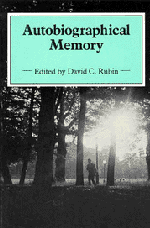Book contents
- Frontmatter
- Contents
- List of contributors
- Preface
- Part I Overview
- Part II Historical, theoretical, and methodological contexts for the study of autobiographical memory
- Part III The general organization of autobiographical memory
- 5 Nested structure in autobiographical memory
- 6 Schematization of autobiographical memory
- 7 Strategic memory search processes
- 8 Autobiographical memory: a developmental perspective
- Part IV The temporal organization of autobiographical memory
- Part V Temporal distributions of autobiographical memories
- Part VI Failures of autobiographical memory
- Author index
- Subject index
8 - Autobiographical memory: a developmental perspective
Published online by Cambridge University Press: 01 March 2011
- Frontmatter
- Contents
- List of contributors
- Preface
- Part I Overview
- Part II Historical, theoretical, and methodological contexts for the study of autobiographical memory
- Part III The general organization of autobiographical memory
- 5 Nested structure in autobiographical memory
- 6 Schematization of autobiographical memory
- 7 Strategic memory search processes
- 8 Autobiographical memory: a developmental perspective
- Part IV The temporal organization of autobiographical memory
- Part V Temporal distributions of autobiographical memories
- Part VI Failures of autobiographical memory
- Author index
- Subject index
Summary
A. I was downtown yesterday. I'm never going again unless I park in a lot. I got a twenty-dollar ticket for parking on the street.
B. Yes, those signs are confusing with all the hours and things.
A. Yes, I think this spot was safe to park fifteen minutes each day.
B. A nice thing happened to me yesterday; a friend called and offered me a free ticket to the opera next week.
A. That's great.
This little vignette illustrates the type of memory termed autobiographical memory. Having developed an interest in autobiographical memory, I am repeatedly struck by the frequency of spontaneous reports of such memories. Although they are more likely to crop up in such situations as after-dinner conversations than in others, such as the classroom, the recall of specific events from the past is a regular, frequently effortless aspect of daily life. These reports, whether fact or confabulation, provide a rich context for the ongoing flow of human experience. This experience then becomes part of the contents of memory. As the chapters in this volume attest, autobiographical memory promises to become a frequent subject of study in psychology, although such study will not be effortless.
In this chapter, autobiographical memory refers to memories of specific events occurring in an individual's daily experience that are stored without the benefit of conscious memory goal activities on the part of the individual. It is this lack of conscious control that leads us to use the term involuntary in characterizing most autobiographical memories.
- Type
- Chapter
- Information
- Autobiographical Memory , pp. 122 - 134Publisher: Cambridge University PressPrint publication year: 1986
- 11
- Cited by



